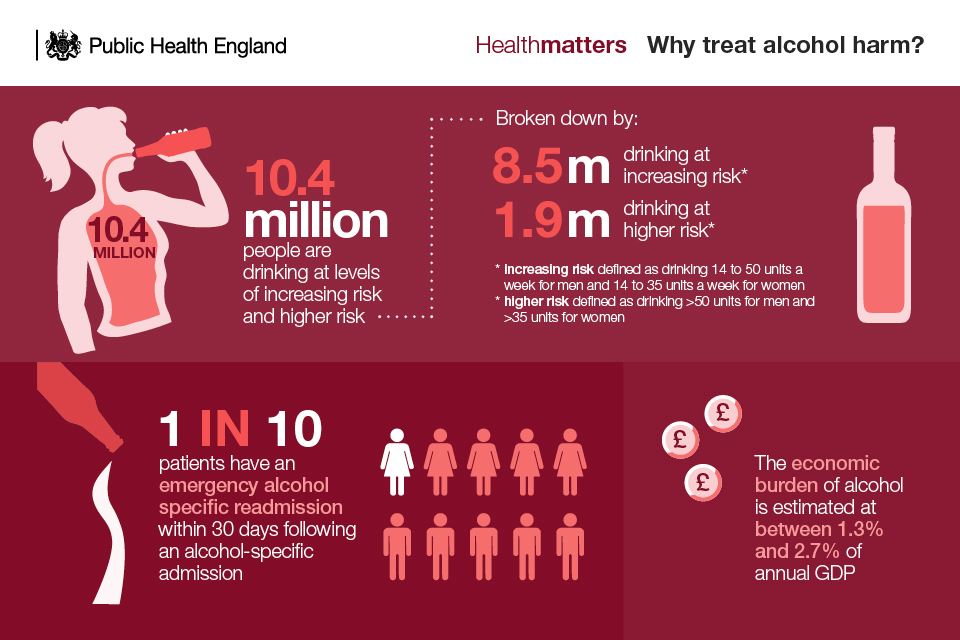Increased Alcohol Use In Women: Health Risks And Doctor's Warnings

Table of Contents
The Rising Trend of Alcohol Consumption Among Women
The increase in women's alcohol consumption is a complex issue with multifaceted contributing factors. Understanding these factors is the first step towards addressing this growing public health problem.
Factors Contributing to Increased Alcohol Use
Several societal and personal factors contribute to the rise in alcohol use among women:
- Stress and Anxiety: In today's fast-paced world, women often face immense pressure to juggle career, family, and personal responsibilities. Alcohol, unfortunately, is sometimes perceived as a quick fix for stress and anxiety, leading to increased consumption.
- Social Pressures and Cultural Norms: The normalization of alcohol consumption in many social settings, coupled with pervasive marketing portraying drinking as glamorous and sophisticated, can pressure women to drink more than they intend.
- Easy Accessibility of Alcohol: The widespread availability of alcohol, both in retail outlets and online, makes it easier for women to access and consume excessive amounts.
- Marketing and Advertising Targeting Women: Alcohol advertising often targets women specifically, using imagery and messaging that appeals to their aspirations and lifestyles, further promoting consumption.
- Underlying Mental Health Conditions: Women struggling with depression, anxiety, or other mental health issues may turn to alcohol as a form of self-medication, exacerbating their condition.
The normalization of alcohol use, particularly within certain social circles, often overlooks the unique vulnerabilities faced by women. This casual approach masks the potential for serious health consequences.
Misconceptions about Alcohol and Women's Health
Several dangerous misconceptions surround alcohol consumption and women's health:
- Myth: Women metabolize alcohol differently than men, therefore facing lower risks with moderate drinking. Reality: While some metabolic differences exist, the overall health risks associated with alcohol are significant for women, even at lower consumption levels.
- Myth: Moderate drinking is beneficial for women's health. Reality: Even moderate alcohol use carries risks, including increased cancer risk and liver damage. The benefits are far outweighed by these potential health hazards.
- Myth: Alcohol is an effective stress reliever. Reality: Alcohol is a depressant, and while it might temporarily dull feelings of stress, it ultimately exacerbates anxiety and depression in the long run.
Serious Health Risks Associated with Excessive Alcohol Consumption in Women
Excessive alcohol consumption in women leads to a wide range of severe health consequences, impacting both physical and mental well-being.
Physical Health Consequences
- Increased risk of breast cancer: Alcohol significantly increases the risk of developing breast cancer, one of the leading causes of cancer-related deaths in women.
- Liver disease: Alcohol abuse can lead to fatty liver disease, cirrhosis, and liver failure.
- Heart disease and stroke: Excessive alcohol use increases the risk of heart disease and stroke, leading to serious cardiovascular complications.
- Gastrointestinal problems: Alcohol can cause gastritis, ulcers, and pancreatitis.
- Osteoporosis: Excessive alcohol consumption weakens bones, increasing the risk of fractures and osteoporosis.
- Fertility issues and pregnancy complications: Alcohol use can negatively affect fertility and significantly increase the risk of miscarriage, premature birth, and Fetal Alcohol Spectrum Disorders (FASDs).
- Weakened immune system: Alcohol weakens the immune system, making women more susceptible to infections and illnesses.
Mental Health Consequences
- Increased risk of depression, anxiety, and other mood disorders: Alcohol abuse significantly increases the risk of developing or worsening mental health conditions like depression and anxiety.
- Exacerbation of existing mental health conditions: Alcohol can worsen existing mental health problems, leading to a vicious cycle of alcohol use and mental distress.
- Increased risk of suicidal thoughts and behaviors: Excessive alcohol consumption is linked to an increased risk of suicidal ideation and attempts.
- Impact on sleep quality: Alcohol disrupts sleep patterns, leading to poor sleep quality and further impacting mental well-being.
Social and Relationship Consequences
- Strained relationships: Alcohol abuse can significantly strain relationships with family and friends, leading to isolation and loneliness.
- Job loss or employment difficulties: Alcohol-related problems can lead to job loss, difficulty maintaining employment, and financial instability.
- Financial difficulties: Excessive spending on alcohol and related consequences can lead to significant financial hardship.
- Increased risk of domestic violence and abuse: Alcohol use is often a contributing factor to domestic violence and abuse.
Doctor's Warnings and Recommendations
Addressing increased alcohol use in women requires early intervention and a multifaceted approach.
Seeking Professional Help
- Early intervention is crucial: The sooner a woman seeks help for alcohol abuse, the better the chances of successful treatment and recovery.
- Treatment options: Treatment options include therapy (cognitive behavioral therapy, motivational interviewing), support groups (Alcoholics Anonymous, SMART Recovery), and medication.
- Role of healthcare professionals: Primary care physicians and specialists play a vital role in identifying and managing alcohol use disorders. They can offer assessments, recommend treatment options, and monitor progress.
- Available resources: Numerous resources, including the National Institute on Alcohol Abuse and Alcoholism (NIAAA) and local support groups, offer valuable support and guidance.
Lifestyle Changes and Prevention
- Stress management techniques: Implementing healthy stress management techniques, such as exercise, yoga, meditation, or spending time in nature, can help reduce the urge to self-medicate with alcohol.
- Healthy lifestyle choices: Maintaining a healthy lifestyle through balanced nutrition, regular exercise, and adequate sleep supports overall well-being and reduces reliance on alcohol.
- Open communication: Open and honest communication with family and friends can provide valuable support and encouragement during the recovery process.
- Responsible alcohol consumption (if applicable): For those who choose to drink, moderation is key. Understanding personal limits and adhering to them is crucial for minimizing health risks.
Conclusion
Increased alcohol use in women presents significant health risks, including increased vulnerability to breast cancer, liver disease, heart problems, mental health disorders, and social difficulties. Doctor's warnings are clear: early intervention is critical. Women experiencing concerns about their alcohol consumption or the alcohol use of a loved one should seek professional help immediately. Resources such as the NIAAA offer support and guidance in managing increased alcohol use in women and reducing alcohol consumption in women. Taking proactive steps to address this issue is essential for protecting women's health and well-being. Don't hesitate; reach out for help today. Your health is worth it.

Featured Posts
-
 Celtics Vs 76ers Prediction A Breakdown Of The Eastern Conference Showdown
May 16, 2025
Celtics Vs 76ers Prediction A Breakdown Of The Eastern Conference Showdown
May 16, 2025 -
 Chinas Strategic Approach To Securing A Us Trade Deal
May 16, 2025
Chinas Strategic Approach To Securing A Us Trade Deal
May 16, 2025 -
 Knicks Upset Celtics In Overtime Thriller Game One Victory
May 16, 2025
Knicks Upset Celtics In Overtime Thriller Game One Victory
May 16, 2025 -
 Nhl Betting Maple Leafs Vs Predators March 22 Predictions
May 16, 2025
Nhl Betting Maple Leafs Vs Predators March 22 Predictions
May 16, 2025 -
 Nhl News Ovechkin Ties Gretzkys Record With 894 Goals
May 16, 2025
Nhl News Ovechkin Ties Gretzkys Record With 894 Goals
May 16, 2025
